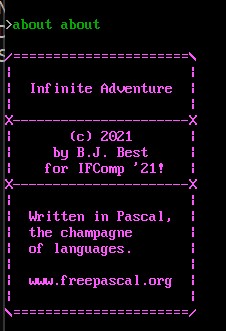I spun this topic off from Interactive fiction popularity metrics:
I analysed the spreadsheet a little to identify development systems that have been used exactly once:
Summary
Applesoft BASIC
Blink!
BASH script
Commodore 64 BASIC
Dedalus
Delphi
Dendry
egamebook
FB Messenger
Floo
GAGS
Glyffe
Godot
Gruescript
Haskell TAE
Hyperfable
Inquisitor
Instead
IntFicPy
Intudia
Jupyter Notebook
Ren’Py
Rexx-Adventure
Ruby
Scott Adams
Scratch
Shockwave
StoryFactory
Storynexus
Strand
SUDS
TextCraft
TIC-80
NOTES:
C VARIANTS
There was a C# game listed, and a C++ one. And while the TIC-80 (a tiny modern computer system I’ve left in the list) is programmed in C, it probably has hardware-specificity that makes it unique, so I kept the TIC-80 in the list. It’s also possible a game in the spreadsheet labelled ‘custom msdos’ could be C, though it’s probably a variant of BASIC. The upshot is, at least three variants of C have been used in total, and two in a hardware-independent way, so I’m not paying the C variants as development platforms that have been used only once.
BASIC VARIANTS
I took the same approach towards flavours of BASIC. Multiple variants of MS-DOS BASIC have been used and listed in the spreadsheet (the majority of the games by Paul Panks) so I’m not paying them as one-shots. In the hardware-specific BASICs, my game Leadlight is the only one in Applesoft, and it looks like Nick Montfort’s Amazing Quest is the only one in C64 BASIC. I thought Paul Panks might have submitted a C64 game, but I think his IFComp entries were all MS-DOS.
PYTHON VARIANTS - DANCE?
Python has been used several times in IFComp and so doesn’t make the list per se, but things get grey. IntFicPy is a specific engine within Python that’s been used once, but could be used again, so I kept it. Jupyter Notebook - is that just Python? Does the hardware make a difference? I don’t know enough to kick it off the list.
One game with platform development ‘Dance’ is listed in the spreadsheet: War of the Willows. I know that ran in Python, so I don’t know if Dance is a Python toolkit (I couldn’t google it up) or a joke or mis-paste. Someone can probably tell me.
THE MORAL OF THIS STORY
You could be unpopular, too! Just use a new and unique development system for your IFComp entry. Or, make yourself unpopular with the author of a game in this list by knocking their game out of this list by being the second person to enter a game into IFComp using the same system they used.
-Wade
